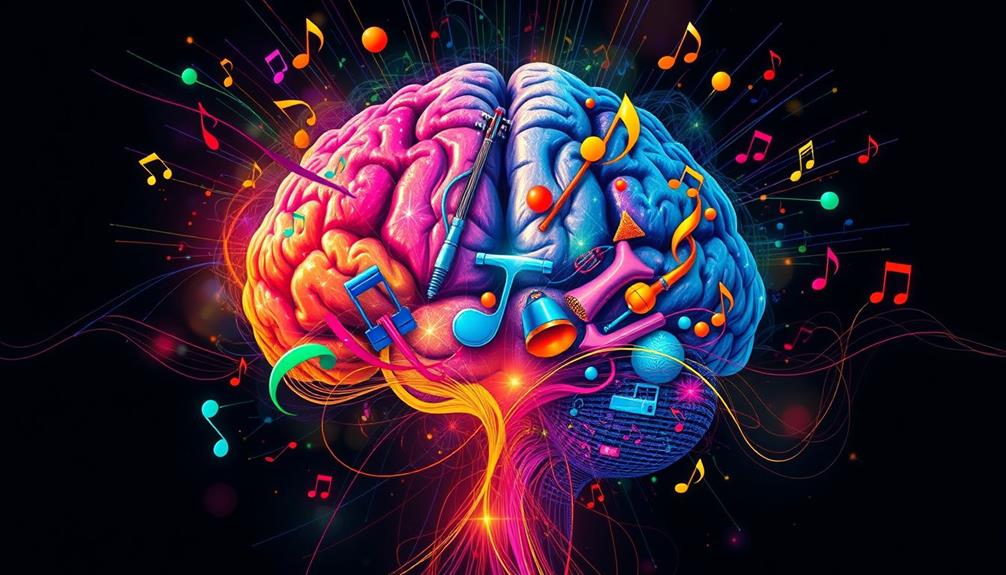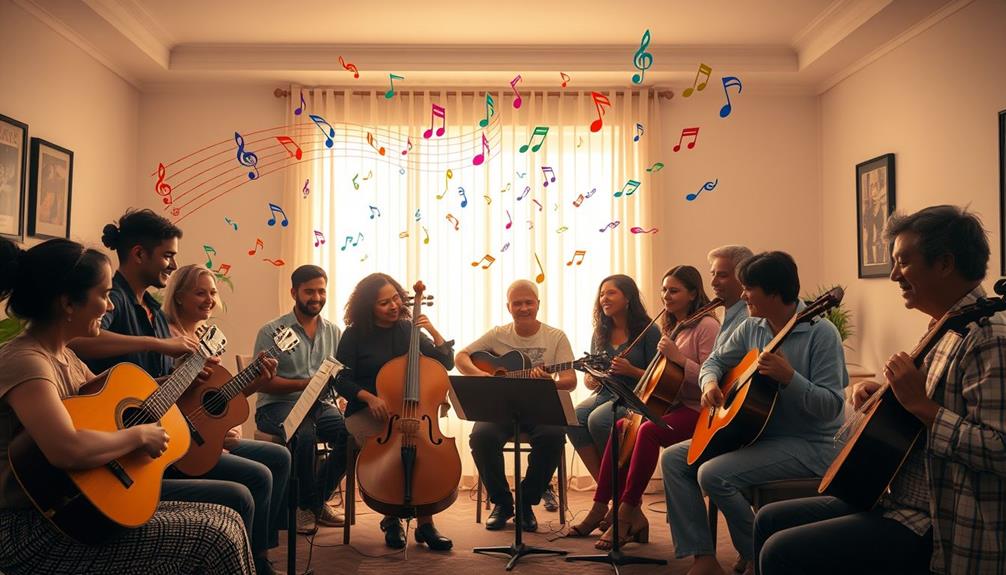In this illuminating interview with Tatiana Penagos, a leading music therapist, you'll explore her journey from mastering the violin to transforming veterans' lives through music therapy. You'll discover her educational pathways, including her Bachelor's in Music Therapy and a Master's from NYU. Tatiana shares her daily responsibilities, emphasizing the tailored sessions she conducts and the emotional healing music brings to clients. She also discusses the impact of community engagement and ongoing professional development in her work. Stick around to uncover how music therapy is evolving and what challenges and trends lie ahead in this impactful field.
Key Takeaways
- Leading music therapists often emphasize the importance of personalized interventions tailored to individual client needs and therapeutic goals.
- Music therapy significantly aids emotional healing, fostering connections and improving communication among individuals, especially those with dementia.
- Continuous professional development through mentorship, networking, and engagement in organizations like the American Music Therapy Association is vital for growth.
- Community engagement initiatives enhance access to music therapy for diverse populations, creating inclusive programs for those with disabilities.
- Effective techniques in music therapy include songwriting and improvisation, which promote emotional expression and well-being.
Background of Tatiana Penagos
Tatiana Penagos has built a remarkable foundation in music therapy that began at a young age. Starting to play the violin at just seven years old, you can see how her passion for music flourished through her involvement in youth and symphony orchestras during high school.
While pursuing her degree in music therapy at Florida State University, she was inspired to shift her focus toward helping people through this powerful medium. The integration of AI in music creation has also opened new avenues for therapeutic practices, allowing therapists to personalize sessions even further. During her junior year, she witnessed the impactful work of board-certified music therapists in neonatal care, which solidified her commitment to the field.
After earning her Bachelor's degree in 2015, Tatiana furthered her education with a Master's degree in music psychotherapy from New York University in 2019.
Her professional journey includes invaluable experiences at Boston Children's Hospital and Mount Sinai Healthcare System, where she honed her skills and deepened her understanding of music therapy's effectiveness.
Now, as a music therapist at the Veterans Health Administration in Gainesville, FL, Tatiana continues to make a difference, using her expertise and empathy to help veterans through the healing power of music.
Education and Certification Path
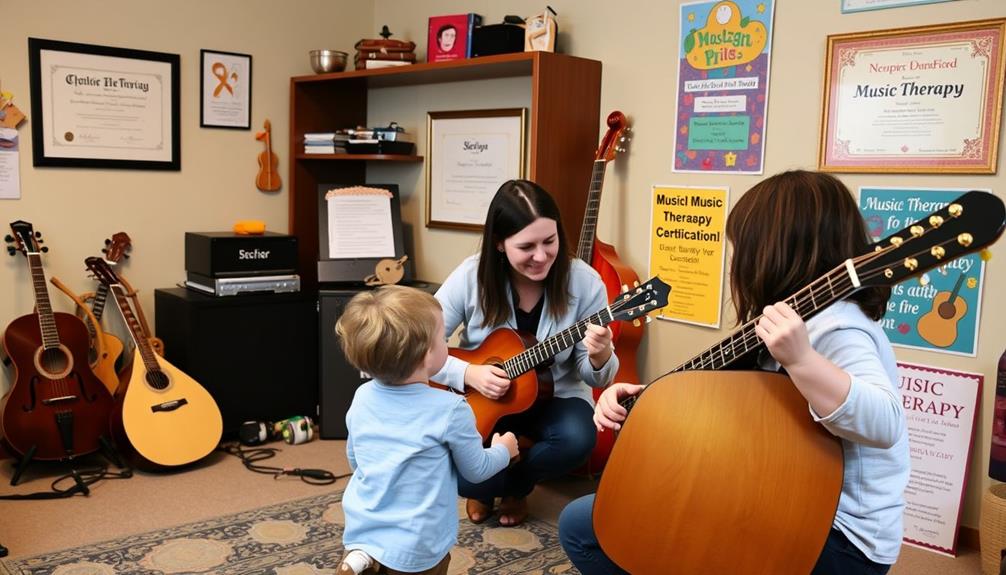
Aspiring music therapists often begin on a thorough education and certification path that lays the groundwork for their future careers. Most of you'll pursue a Bachelor's degree in Music Therapy or complete an equivalency program if you already hold a related degree. This typically takes about 4.5 years and includes essential clinical requirements, which involve a minimum of 1200 hours of hands-on experience through unpaid internships.
In today's digital age, understanding the importance of data protection regulations can also be beneficial for music therapists who may work with sensitive client information.
Your coursework in a music therapy program will cover fundamental subjects such as music theory, ear training, psychology, and specialized music therapy classes. These courses equip you with a diverse skill set that's important for the profession.
To become a board-certified music therapist (MT-BC), you must pass the Certification Board for Music Therapists (CBMT) Board Certification examination after successfully completing your degree and clinical training.
Additionally, it's highly recommended that you shadow a practicing music therapist during your studies. This firsthand experience will help you gain valuable insights into the profession's demands and rewards, making your shift into the field smoother and more informed.
Daily Responsibilities of a Music Therapist
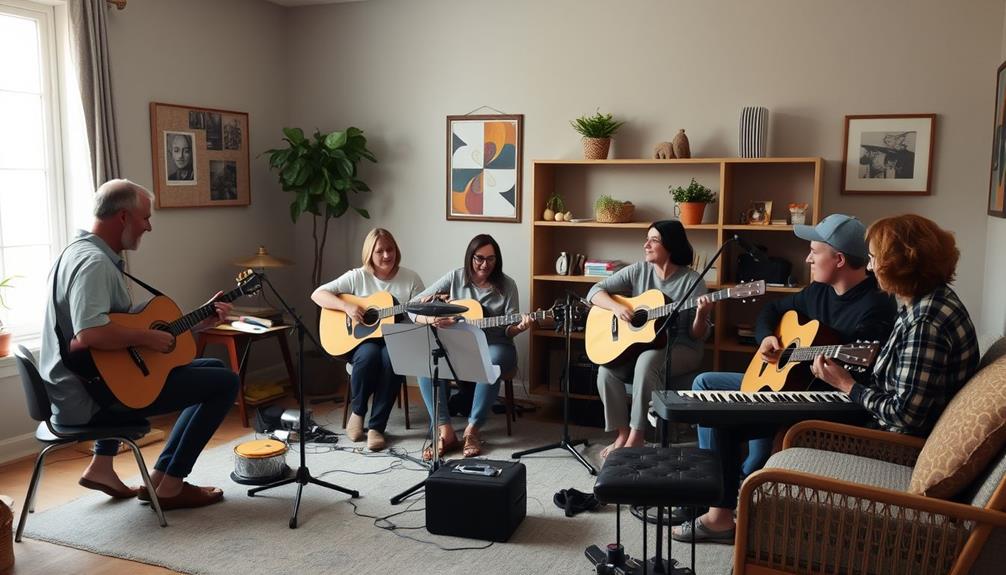
As a music therapist, your daily responsibilities center around conducting sessions tailored to meet the specific treatment goals of your clients. You might work in outpatient settings like clinics or provide services through telehealth. Each day presents unique challenges and opportunities as you focus on enhancing mental health and achieving therapeutic objectives.
Understanding the importance of a supportive environment can also be beneficial, much like how dog training and socialization plays a vital role in developing well-rounded pets.
Your tasks often include:
- Conducting music therapy sessions: You facilitate individual and group sessions, adapting techniques to address varied issues, such as substance abuse.
- Documenting progress: After each session, you write detailed notes in medical charts to track progress on goals and objectives.
- Utilizing therapeutic techniques: You employ a range of interventions, including songwriting and guitar playing, to foster emotional expression and healing.
- Collaborating with teams: You attend interdisciplinary meetings and provide educational in-services to enhance patient care and share your expertise.
In private practice, you may also focus on building client relationships, adapting your approach based on feedback and the evolving needs of your clients.
Each responsibility plays a vital role in supporting your clients on their journey to better mental health.
Impact of Music Therapy
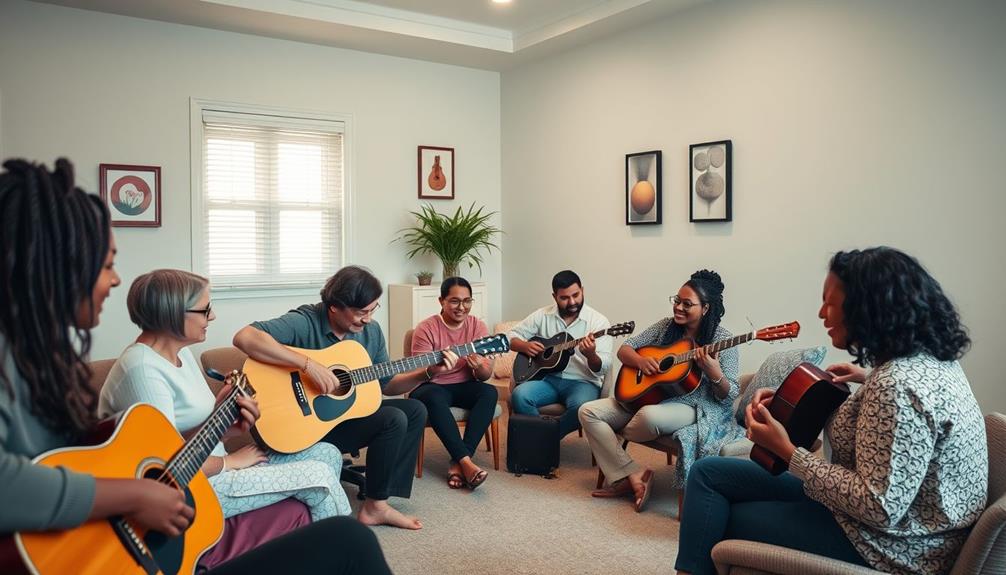
Music therapy can be a powerful tool for emotional healing, connecting individuals to their feelings and fostering a sense of joy.
It incorporates various techniques, including yoga for back pain management, which can enhance overall well-being.
It not only supports personal growth but also builds community through shared experiences and engagement.
Research-backed techniques guarantee that these therapeutic benefits are effective and tailored to meet diverse needs.
Emotional Healing Through Music
Many individuals find emotional healing through music therapy, a powerful approach that serves as a therapeutic outlet for those facing psychological and physical challenges. This form of therapy utilizes various therapeutic techniques, such as songwriting and improvisational music-making, to foster joy, reduce anxiety, and promote emotional resilience.
Additionally, shared musical experiences can often lead to the formation of deeper connections, similar to how reviving old friendships can enhance emotional support. Research highlights the effectiveness of music therapy in enhancing the quality of life for individuals with dementia, markedly improving their emotional connections with caregivers and family members.
Here are some benefits you might experience through music therapy:
- Improved mood: Engaging with music can elevate your spirits and enhance emotional well-being.
- Enhanced communication: Music therapy can help you express feelings that might be difficult to articulate verbally.
- Emotional connections: You'll often feel comforted and supported through shared musical experiences.
- Positive memories: Musical interactions can create lasting, joyful memories that contribute to emotional healing.
Community Engagement and Support
Community engagement plays an essential role in the impact of music therapy, fostering connections that extend beyond individual sessions. By collaborating with various organizations, music therapy services, like those from Richmond Music Trust, create inclusive programs that cater to diverse needs, much like the way Aboriginal art features distinctive styles that reflect cultural expression.
This approach not only supports people with autism and learning disabilities but also emphasizes the importance of emotional well-being across all ages.
Programs such as the HOMESIDE trial show how involving family members enhances the therapeutic experience for dementia patients. When families engage in the process, they gain a better understanding of care needs, which can lead to improved communication and quality of life.
Additionally, community initiatives recognized for their high-quality services focus on making creative health accessible for individuals facing psychological and physical challenges.
These stories of success highlight the profound impact music therapy can have when community engagement is prioritized. Participants often experience significant improvements in emotional well-being, illustrating that music therapy isn't just about individual experiences; it's about building a supportive network that enriches lives and strengthens community bonds.
Evidence-Based Therapeutic Techniques
Therapeutic techniques in music therapy are grounded in evidence and tailored to meet specific client needs. The focus is on achieving therapeutic outcomes rather than honing performance skills. Each intervention is carefully designed based on individual assessments, guaranteeing the approach aligns with the client's unique challenges and goals.
Additionally, integrating elements of mind-body connection can enhance the therapeutic experience, promoting deeper emotional engagement. Here are some key techniques used in music therapy:
- Therapeutic Singing: Engages clients to express emotions and enhance communication.
- Dynamically Cued Singing: Supports individuals with verbal communication challenges by using music cues.
- Iso Principle: Matches music to the client's current emotional state, facilitating connection and expression.
- Adaptation to Research Findings: Continuous learning guarantees therapists stay current with effective methods.
Participants often report deep emotional connections and positive memories formed during sessions, showcasing the profound impact of music therapy on well-being.
Professional Development Experiences
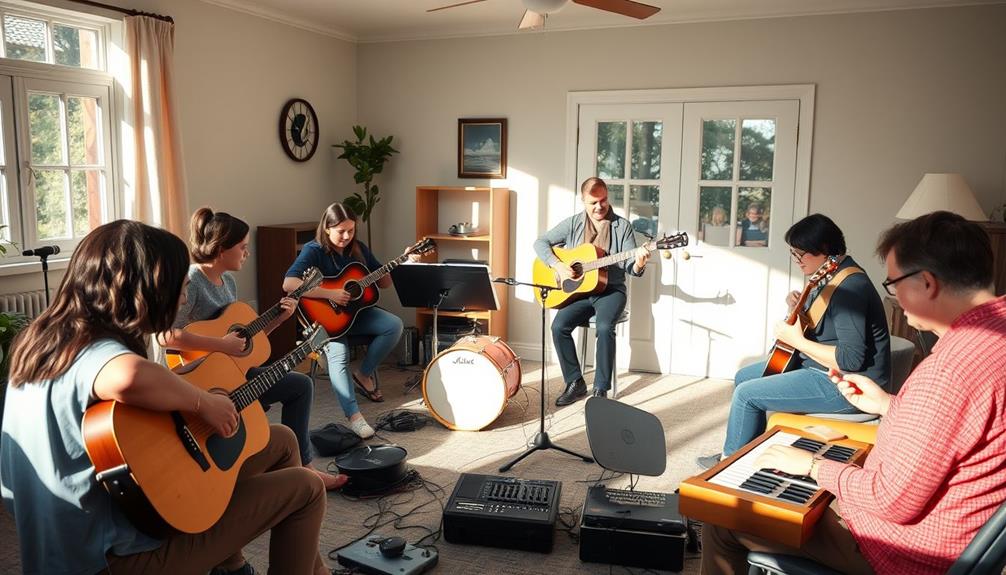
Your journey in music therapy starts with early volunteer experiences, like those at St. Elizabeth's Hospital, where you grasp the real-world impact of compassion in the field.
Gaining a foundational understanding of essential tools for creating engaging music tracks can also enhance your effectiveness as a music therapist.
Mentorship from seasoned professionals can further guide your understanding and practices, making a lasting impression on your career.
Getting involved in organizations such as the American Music Therapy Association opens doors for networking and ongoing learning that are crucial for your development.
Early Volunteer Experiences
During their formative years, many aspiring music therapists discover the profound impact of early volunteer experiences on their professional journey. Engaging in volunteer work, like what Tatiana Penagos did at St. Elizabeth's Hospital, provides you with foundational insights into the therapeutic process and how music affects various populations.
These experiences expose you to real-world settings, helping you understand the diverse needs of clients and the dynamics of therapeutic relationships. Additionally, understanding the importance of emotional support, as seen in hospice care, can enhance your approach to working with clients facing various challenges.
Here are some key benefits of early volunteer experiences:
- Skill Refinement: You can adapt music interventions to meet individual client goals effectively.
- Real-World Exposure: You'll gain hands-on experience in various therapeutic settings.
- Networking Opportunities: Volunteering can connect you with professionals in the music therapy community.
- Informed Philosophies: These experiences shape your educational paths and therapeutic beliefs.
Mentorship and Guidance
As you navigate your journey in music therapy, mentorship and guidance play a pivotal role in shaping your professional development. Engaging with mentors like Mr. Gibbons and Charles Eagle at Texas Woman's University can enhance your understanding of compassion and the nuances of the field, contributing greatly to your professional growth.
Here's a quick overview of how mentorship can influence your music therapy career:
| Aspect | Description | Benefits |
|---|---|---|
| Early Experiences | Volunteering at facilities like St. Elizabeth's Hospital | Gain foundational insights |
| Mentors | Learning from seasoned professionals | Build compassion and understanding |
| Networking | Involvement in the American Music Therapy Association | Access resources and opportunities |
| Continuous Learning | Staying engaged with current trends | Adapt and grow in your practice |
Professional Organization Involvement
Engaging actively in professional organizations like the American Music Therapy Association is essential for your career development and staying informed about industry advancements. By participating, you open doors to networking opportunities that can enhance your professional visibility and credibility.
Additionally, as the demand for specialized roles such as AI ethicists continues to grow, professionals in various fields, including music therapy, can benefit from understanding the ethical implications of technology in their practice.
Here are some key benefits of being involved in these organizations:
- Networking Opportunities: Meet peers and leaders in the field, fostering relationships that could lead to collaboration.
- Professional Development: Attend workshops and conferences to sharpen your skills and stay updated on music therapy practices.
- Exchange of Ideas: Collaborating with fellow professionals allows you to share techniques and best practices that can improve your therapy sessions.
- Credibility Building: Contributing to professional organizations establishes your reputation and supports the advancement of the music therapy field.
Your active involvement not only benefits you but also contributes to the broader community of music therapy.
Trends and Challenges Ahead
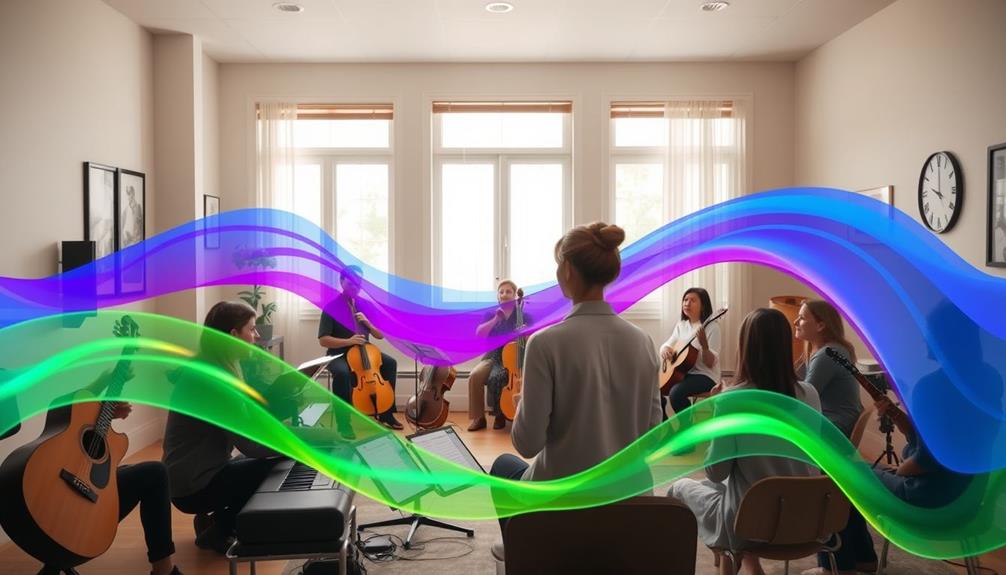
An increasing number of schools are recognizing the value of music therapy, making it a significant trend in educational settings. This growth reflects a broader understanding of how music therapy benefits children's learning and emotional well-being.
However, you might face challenges along the way, such as limited follow-through on implemented programs and issues with equipment availability. It's important to navigate these hurdles to guarantee that music therapy thrives in schools.
Additionally, there's a growing emphasis on expanding music therapy services to the senior population. As you work to enhance their quality of life and cognitive function, it's imperative to secure federal funding and improve public education on the profession's benefits.
These efforts will play a fundamental role in the growth of music therapy over the next 10-20 years.
To support this burgeoning field, internship programs are being established that focus on training for future music therapists. These programs often emphasize assisting children with disabilities, helping improve their learning and self-esteem.
Personal Life and Work Balance

Steering through the demands of a career in music therapy can be challenging, especially when trying to balance work with personal life.
You'll find that managing professional commitments while nurturing personal relationships is essential for sustaining your passion and emotional well-being. Family support plays a significant role in this balance, helping you navigate the ups and downs of your career.
Here are some tips to create harmony between your work and personal life:
- Involve family in your practice: Share your therapeutic experiences with loved ones to deepen connections and create shared understanding.
- Establish boundaries: Set clear limits between your professional duties and personal time to avoid burnout.
- Prioritize self-care: Incorporate personal music practice into your daily routine to maintain your passion and creativity.
- Seek support networks: Participate in communities or groups of fellow music therapists to share experiences and gain insights.
Frequently Asked Questions
What Qualities Should a Music Therapist Have?
A music therapist should possess strong musical skills, empathy, excellent communication abilities, and adaptability. You'll need to connect with clients, convey goals clearly, and continuously learn to meet diverse needs in therapeutic settings effectively.
What Is the Primary Goal of a Music Therapist?
Imagine a soothing melody wrapping around you like a warm blanket. The primary goal of a music therapist is to use music to nurture your emotional, psychological, and physical well-being, fostering healing and connection in your life. Studies have shown that music therapy benefits individuals with various conditions, such as depression, anxiety, and chronic pain. By using music as a tool, a music therapist can help improve overall quality of life by reducing stress, improving communication, and promoting relaxation. Engaging in music therapy can also enhance self-awareness and promote a sense of empowerment and self-expression.
What Type of Music Is Most Effective in Music Therapy?
In music therapy, the most effective music aligns with your emotional state. Familiar songs can evoke memories, while upbeat rhythms promote movement. Tailoring selections to your preferences enhances engagement and fosters deeper emotional connections during sessions.
How Do You Demonstrate Music Therapy?
Imagine revealing emotions like a treasure chest; you demonstrate music therapy by tailoring interventions to your client's needs. You use instruments, improvisation, and the Iso Principle, creating a melodic bridge to healing and connection.
Conclusion
In wrapping up, you can see how Tatiana Penagos embodies the heart of music therapy, blending notes of compassion and science like a vintage record spinning in a digital age. Her journey shows that music isn't just sound; it's a powerful tool for healing. As trends evolve and challenges arise, staying connected to the rhythm of change will be essential. Ultimately, the balance she strikes in her personal and professional life sets a harmonious example for aspiring therapists.



